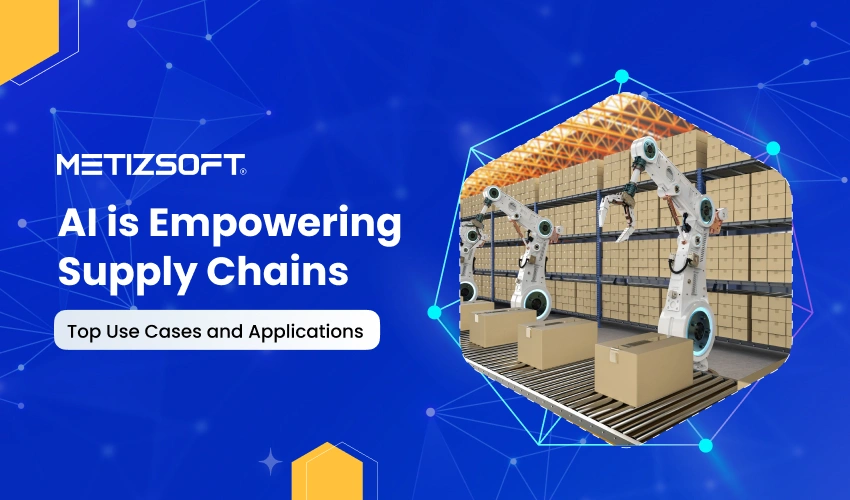
Table of Contents
Introduction
AI’s growing grip on the supply chain is taking a new leap every quarter and year. According to Meticulous Research, the adoption of AI in the supply chain has skyrocketed. The market size is expected to reach $58.55 billion by 2031 at a CAGR of 40.4% from 2024 to 2031. These numbers are not surprising at all. Business owners have understood the potential of AI and how the technology can transform their business operations with sheer automation. In contrast, they are leveraging unified AI use cases and applications to streamline supply management and achieve desirable results.
In this blog post, we have listed down the most impactful use cases and applications of AI for supply chain management. Consider these in your setup to drive ultimate growth.
AI’s Role in Transforming the Supply Chain Landscape
Businesses need cost-efficient, scalable, and easy-to-navigate technology solutions for their supply chains. It is not only to cut the competition but also to embrace growth in the peak era of digitalization. That’s the reason the demand for AI implementation is emerging rapidly.
In 2024, the worldwide market for generative AI in the supply chain was valued at $640.04 million. This figure increased to $932.02 million in 2025. Now, it is expected to reach approximately $27,441.93 million by 2034, growing at a CAGR of 45.62% from 2024 to 2034.
Companies leverage generative AI to streamline product development and sales. Specifically, it functions with workflow and enables virtual logistics management. Plus, AI’s advanced analytics and decision intelligence help them make faster and more strategic, tactical, and accurate decisions.
You are only a decision away from making the most of generative AI in your supply chain cycle. Hire AI developers from a verified resource to build scalable AI for seamless supply chain management!
Top Use Cases and Applications of AI in Supply Chain
Planning
Demand Forecasting: Traditional demand forecasting doesn’t consider key factors like changing consumer preferences, market disruptions, or economic shifts. Instead, it mainly relies on historical sales data to identify trends and seasonality. However, Antuit.ai provides a Demand Planning and Forecasting solution. This solution leverages sophisticated AI and machine learning algorithms to anticipate consumer demand over various time frames.
Sustainability: AI is helping organizations make data-driven decisions, leading to better environmental, social, and governance (ESG) results. Specifically, companies can trace and monitor their entire supply chains with AI. Consequently, this will help them find and fix areas where they’re wasting resources or being inefficient.
Pricing: Setting prices these days isn’t the walk in the park it once was. That’s because customers have access to many resources, like online catalogs and specialized search tools, to easily compare prices across products. However, Accenture’s Solutions.AI for Pricing leverages cutting-edge AI and machine learning, plus deep learning and game theory, to fine-tune pricing strategies on the fly.
Manufacturing
Inventory Management: Inventory management traditionally relies on manual processes and past data to make decisions. However, AI-powered systems are changing the game by using real-time information and predictive analytics to make inventory decisions smarter. Let’s explore some of the ways AI is being used in inventory management today:
- Sales Forecasting
- Customer Segmentation
- Inventory Optimization
Predictive Maintenance: As businesses face increasing costs and supply chain issues, getting the most out of their physical assets is more important than ever. AI-driven predictive maintenance can help you do just that by squeezing every last drop of value from your current setup. Using AI, models can sift through sensor readings, maintenance records, and operational details. They can spot trends and irregularities that suggest a piece of equipment might be about to break down.
Risk Management: This segment in the supply chain is all about pinpointing, evaluating, and lowering potential threats that could come from anywhere in the supply network. For instance, an AI model might look at satellite images and weather reports to figure out the chances of flooding in crucial manufacturing areas. AI-driven tracking systems give a detailed, up-to-the-minute view of how goods are moving through the supply chain.
Warehouse Automation: DHL, a big shipping company, is working with a tech company called Robust.AI to use robots in their warehouses. While the focus is on robotics, many warehouse automation setups also rely on a Warehouse Management System (WMS) to track inventory, guide robot workflows, and ensure efficiency across operations.
Carter uses smart computer brains (AI) to do a few things:
- Find the best way to pick orders
- Adjust to changes
- Help improve the warehouse
These robots are meant to make the warehouse run more smoothly and safely. They’re also there to help the human workers, not replace them.
Product Planning & Scheduling: Planning what to make and when to make it is super important in the supply chain. It helps them utilize their resources wisely, save money, and get products to customers on time.
Here’s how AI enhances product planning and scheduling:
- Efficient Resource Allocation
- Real-time Adaptability
- IoT Integration
Sourcing & Procurement
Supplier Relationship Management: AI helps companies choose and manage the best suppliers by using machine learning to analyze data, understand language, and identify patterns. This allows businesses to find reliable partners to provide the necessary goods and services.
Spend Analysis & Cost Optimization: AI tools can quickly sort through all that purchase information. They use smart computer brains to automatically group similar purchases together, even if different departments or sellers call the same thing by different names. This helps the company understand where its money is going.
Procurement: AI, along with its smarter cousin, generative AI, can really change how companies buy stuff. AI can gather information from many places to see what’s happening with the things companies need. It can also read through complicated contract papers and pull out important details like dates, payment terms, and other key information.
Automation
Route Optimization: AI looks into tons of information from GPS, cameras, and phones to give drivers real-time traffic updates. This helps find the fastest way to go, avoiding traffic jams and saving time and gas. Even better, AI can learn from past traffic patterns and things like the weather to predict where traffic might get bad and suggest better routes before there’s a problem.
Fleet Tracking & Monitoring: AI-powered tracking systems help companies keep an eye on their vehicles. Specifically, they can see where each vehicle is, how fast it’s going, and how much gas it’s using, all in real time. Consequently, this helps them make quick, smart decisions and fix any problems right away. AI helps in:
- Asset Tracking & Monitoring
- Driver Behavior Analysis
- Fuel Efficiency Optimization
Order Fulfilment: AI can help businesses figure out what they need to have in stock by looking at what they have now, what’s selling well, and what customers want. This helps them predict what they’ll need in the future. AI can also help automate warehouse jobs like picking orders, packing them up, and getting them ready to ship.
Final Thought
As we conclude a thorough and thoughtful discussion of the role and impact of AI in supply chain management via its game-changing use cases and applications, the main question now arises: how quickly do you want to enable this technology and enjoy its tangible benefits? We understand it’s not going to be an instant decision; you require a more strategic point of view and a practical approach according to your budget and requirements. This is where Metizsoft comes in, your trusted AI development company!
We’ve established an open and innovative AI environment where our experts develop game-changing AI roadmaps for all niches. From initial consultation to the AI integration masterplan and successful execution, we make it a seamless process.
AboutManthan Bhavsar
Related Posts
Conversational AI in Healthcare Industry: Key Benefits & Uses Explained
Table of Contents SummaryIntroductionWhat is Conversational AI in Healthcare?Conversational AI vs. Rule-based Chatbots...
How is Agentic AI Reshaping the Retail Industry? Top Benefits and Use Cases
Table of Contents IntroductionThe Growth of AI in Retail: Key StatisticsAgentic AI Evolution in RetailTop Use Cases of AI in...

